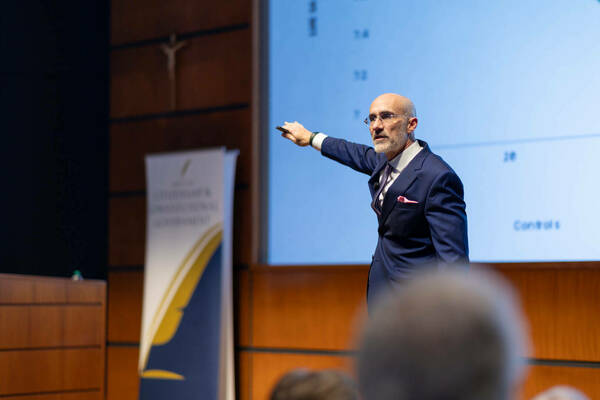
Harvard Professor Arthur C. Brooks spoke on "Moving from Strength to Strength in Work, Life, & Happiness" on November 6 for an event the CCCG cosponsored with the Mendoza School of Business. Brooks is the William Henry Bloomberg Professor of the Practice of Public Leadership at Harvard Kennedy School and Professor of Management Practice at Harvard Business School.
After a career as a classical musician and a ten-year stint as the president of the American Enterprise Institute (AEI), a public policy think tank in Washington, D.C., Brooks said he began to feel unsettled with the direction of his life and the declination of his happiness. After listening to a conversation on a plane between an elderly man and his wife about feeling useless at the end of his career, Brooks said he began to question the ‘corporate ladder’ mindset: “Either the model the world tells you for happiness and success is wrong – work hard, play by the rules, bank it, be successful, die happy – either that’s wrong, or this guy is broken.”
Brooks decided to change his career path and study the phenomenon of happiness. After researching for 8 years, Brooks said he thinks he’s “cracked the code.” He now teaches a course at the Harvard Business School on the science of happiness titled “Leadership in Happiness.”
He presented data from several studies on human happiness which show that “on average, your happiness is going to slightly decline from your early twenties until your early fifties, and then it’s going to start back up again” – the opposite of what most of his students think, which is that that they will continue to get happier until they reach elderly age. Brooks said it’s because we are thinking about happiness in the wrong way: “Happiness is not a feeling. It’s a combination of enjoyment, satisfaction, and purpose.”
While in one’s thirties and forties, enjoyment is low due to the stress of work and teenage children. It isn’t until one’s fifties that they “start to reap the investments of meaning in [their] life.” Happiness then increases until about age 70, when the population splits into two – those who continue to increase their happiness, and those who go back on the downward trend.
How can the average person ensure they are on the upper branch? Brooks says it relates to seven things: smoking, drinking, eating, exercising, coping with negative emotions, continuing to learn, and most of all: love. The last three are the most important. In dealing with negative emotions, Brooks says “the best Catholic way to do this is prayer and daily mass … why? Because it makes you metacognitive. Which simply means that you’re aware of your emotions so that you are able to manage them and they don’t manage you.”
While these seven strategies are key for the average person, Brooks says “strivers,” that is, high-achieving individuals, must approach happiness in a different way. In fact, the more successful you are in your career, the more likely you are to end up on the lower branch, declining in happiness from retirement until death. This is what Brooks calls “the striver’s curse,” because these high-achievers place so much weight on the power they hold in their career and the expectations of others.
“If you want to find the loophole so you can be successful and happy,” Brooks says “you’re going to have to stand up to your natural inclinations.” He means we must step away from this “more, more, more” idea of the Western world and set boundaries on our wants, making the denominator in the haves/wants fraction smaller. Brooks reminded us of what the Gospels teach about limiting our earthly desires: “The happy life is not about wanting more, it’s about wanting less from the current world, identifying our idols and chipping them away.” When we manage our wants we are able to achieve lasting satisfaction.
“If [successful happy people] don’t figure this out, then they’re in the ‘more, more, more’ game until they die, and that’s a fool’s errand, that’s an exercise in futility, that’s the downward spike in the happiness curve. But if they’re in the ‘want less’ business, then they can get happier and happier notwithstanding their worldly success,” Brooks says. “Your true self is not the sum of your achievements. It is the sum of the love for the people in your life…and the divine love that can tie it all together and have it all make sense.”
Article contributed by CCCG Writing Fellow Merlot Fogarty.